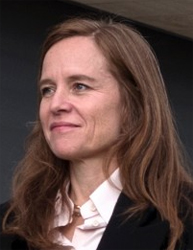Data Confidence Drives Clinical, Financial Perseverance

By Matthew Pillar, Editor, Bioprocess Online

When Mai-Britt Zocca, Ph.D. founded her first biotech company back in 2011, she was admittedly a bit apprehensive about certain aspects of the job. A scientist by training, she’d spent much of her career in the lab, focused on science and data and, eventually, leading research teams focused on the same. At DanDrit Biotech, she exercised those leadership chops over the course of a fast acceleration from production scientist to Chief Scientific Officer and, eventually CEO in just under six years’ time. But when the opportunity to take that seat in the corner office was presented to her, her balk was brief.

Dr. Zocca had built DanDrit’s research group and was heavily involved in helping the company navigate its clinical programs. Scientifically, she felt strong. She was in her sweet spot there. It was the financial aspect of building such a young company that caused her discomfort.
That apprehension didn’t last long. Just one night, in fact. Instead of shying away from the challenge, Dr. Zocca did what scientists do. She found a solution. She agreed to take on the role, with one stipulation. The previous CEO, who was staying on at DanDrit in a board capacity, would guide her through the financial learning curve.
Fast-forward to January 2015, when Dr. Zocca took on her current role as founder and CEO of clinical-stage biopharma IO Biotech. Per her training, she launched the company on the back of her confidence in scientific data. But she also held no reservations whatsoever about establishing a firm financial footing for a startup biotech. In fact, she recently tested that mettle and won, in a fundraising environment riddled with challenges.
Raising Money In A Crowded Market, During A Pandemic
In 2021, on the heels of a ten-month fundraising effort conducted almost entirely in virtual mode given COVID-19 lockdowns and just ahead of the most restrictive capital markets we’ve seen in well over a decade, IO Biotech announced completion of a $150 million Series B.
“We were attempting that raise during a time when we weren’t able to travel. We couldn’t go the U.S.,” recalls Dr. Zocca, which was particularly problematic in that the company was earnestly attempting to expand its global presence. Today, IO Biotech operates facilities where it was founded in Copenhagen, as well as New York City, Rockville MD, and Monmouthshire, England. The company also wanted to capitalize on its momentum, global pandemic or not. Late in 2020, it had been granted breakthrough designation based on its Phase 1 data in immuno-oncology candidates IO102 and IO103, in combination with anti-PD-1 in unresectable/metastatic melanoma. The company’s next clinical steps would require a cash infusion.
Dr. Zocca started with investors she knew. The story, and most importantly, the company’s early clinical data, resonated. HBM Healthcare Investments led the round. Existing investors Novo Seeds, Lundbeckfonden Emerge and Sunstone Life Science Ventures doubled down. New money came in from Vivo Capital, Kurma Partners, Avoro Capital, RA Capital Management, Samsara Biocapital, Idinvest Partners1, PFM Health Sciences, Soleus Capital, Eir Ventures and Serrado Capital. The result was oversubscribed.
The confidence in IO Biotech’s clinical data exhibited by the investment community supporting it is not lost on Dr. Zocca. The anti-PD-1 checkpoint inhibitor space is a crowded one that’s been marked by its fair share of failures. Notably, Incyte’s 2018 phase 3 trial of the pembrolizumab-epacadostat combination failed to achieve its primary end points of increased overall survival or progression-free survival. That cast some widespread doubt around the target, and Dr. Zocca remembers it well. I asked her if previous failures in the space created headwinds for IO Biotech, and how the company maintained its position on the fight as one worthwhile, even as many in the industry frowned on it.
“I remember that day in April 2018, and it was a very sad day for those in the IO community,” says Dr. Zocca. “We all held high hopes for the outcome of that trial, and I won’t say it didn’t shake us, because of course it did,” she admits. So, how does a company like IO Biotech respond? How does it establish differentiation? Again, Dr. Zocca leaned into the data. “Despite the impact of that trial, we didn’t change what we were doing. We’ve established our mechanism of action, which is completely different from small molecule inhibitors like epacadostat,” she explains. What IO Biotech did change, she says, is its approach to all the questions that were being asked on the heels of that well-publicized phase 3 failure. “We honed our response and made sure we were ready to really address our differences through our data, which is what it all boils down to. That’s what leads us and guides our decision-making.”
Women Leading Biotech? Just Do It.
As Dr. Zocca and I wound down our conversation, I asked her for some perspective on being a female founder, and what advice she might have for other women working toward that goal. Her response was simple and pointed. “Just do it,” she said. “Don’t think so much. I’m a mentor to some young, aspiring female CEOs. We don’t talk so much about being female. We just talk about doing it. I didn’t think much the first time I was challenged to take on a CEO role. I slept on it for a night. I had small children. I was building a family and dealing with all the matters female CEOs deal with. And I just did it. I make it sound easy, but it wasn’t, and I wouldn’t do it any other way.”
Tune in to the whole conversation with Dr. Zocca on episode 114 of the Business of Biotech.
